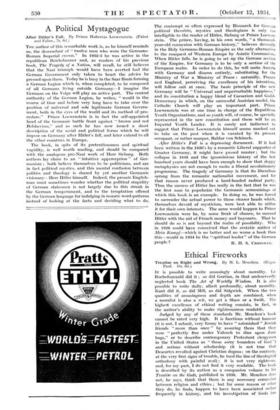A Political Mystagogue
After Hitler's Fall. By Prince Hubertus Loewenstein. (Faber and Faber., 7s. 6d.) THE author of this remarkable work is, as he himself reminds us, the descendant of twelve men who wore the Germano- Roman Imperial crown." In 1932-3 he was active in the republican Reichsbanner and, as readers of his previous book, The Tragedy of a Nation, will recall, he still believes that the Nazi triumph would have been averted had the German Government only taken to heart the advice he pressed upon them. Today he is busy in the Saar Basin forming a German Legion which is, when completed, to be composed of all Germans living outside Germany—I imagine the Germans on the Volga will play an active part. The central authority of the German Legion, he writes, "would in the course of time and before very long have to take over the position of Universal and sole legitimate German Govern- ment, both in the eyes of the world and its method of pro- cedure." Prince Loewenstein is in fact the self-appointed head of the Germanic battle front against "brown and red Bolshevism," and as such he has now issued a short description of the social and political forms which he will impose on Germany after Hitler's fall, and later extend to all the other countries in Europe.
The book, in spite of its pretentiousness and spiritual vapidity, is well worth reading, and should be compared with the analogous pro-Nazi work of Herr Sieburg. Both authors lay claim to an "intuitive apperception" of Ger- manism; both believe themselves. to be politicians, and are in fact political mystics, and this mental confusion betwcen politics and theology is shared by yet another Germanic visionary—Herr Hitler himself. Indeed, the prosaic English- man must sometimes wonder whether the political stupidity of German statesmen is not largely due to this streak in the German temperament, and to the temptation offered by the German language for indulging in roseate word-patterns instead of looking at the facts and deciding what to do. The contempt so often expressed by Bismarck for German political theorists, mystics and theologians is only too intelligible to the reader of Hitler, Sieburg or Prince Loewen- stein. The prince, having, in his own words, "a thousand- year-old connexion with German history," believes devoutly in the Holy Germano-Roman Empire as the only alternative to the conquest of Western Europe by Asiatic Communism. When Hitler falls, he is going to set up the German section of the Empire, for Germany is to be only a section of the European realm. In order to do this, he will unite Austria with Germany and disarm entirely, substituting for the Ministry of War a Ministry of Peace : naturally, France and England, perceiving the excellence of his intentions, will follow suit at once. The basic principle of the new Germany will be "Universal and unperturbable happiness," and its constitution a happy blend of Caesarism and Guild. Democracy in which, on the successful Austrian model, the Catholic Church will play an important part. Prince Loewenstein was at one time in charge of the Republican Youth Organizations, and so youth will, of course, be specially represented in the new constitution and there will be an Imperial Youth Leader. It is surely not indiscreet to suggest that Prince Loewenstein himself seems marked out to take on the post when it is vacated by. its present occupant, or rather usurper, Baldur von Schirach.
After Ilitler's Fall is a depressing document. If it had been written in the 1830's by a romantic Liberal supporter of Greater Germany, it might have passed muster; but the collapse in 1848 and the ignominious history of the last hundred years should have been enough to show that sloppy metaphysics are not enough to make a liberal revolutionary programme. The tragedy of Germany is that its liberalism sprang from the romantic nationalist movement, and for that reason never produced a hard-headed radical party. Thus the success of Hitler lies really in the fact that he was the first man to popularize the Germanic sermonizings of which this book is an example. In doing so, he was forced to surrender the actual power to those clearer heads which, themselves devoid of mysticism, were best able to utilize it for their own interests. The same would happen to Prince Loewenstein were he, by some freak of chance, to succeed Hitler with the aid of French money and bayonets. That he should do so is not beyond the realm of possibility. Who in 1926 could have conceived that the ecstatic author of Mein Kampf—which is no better and no worse a book than this—would in 1934 be the "spiritual leader" of the German














































 Previous page
Previous page